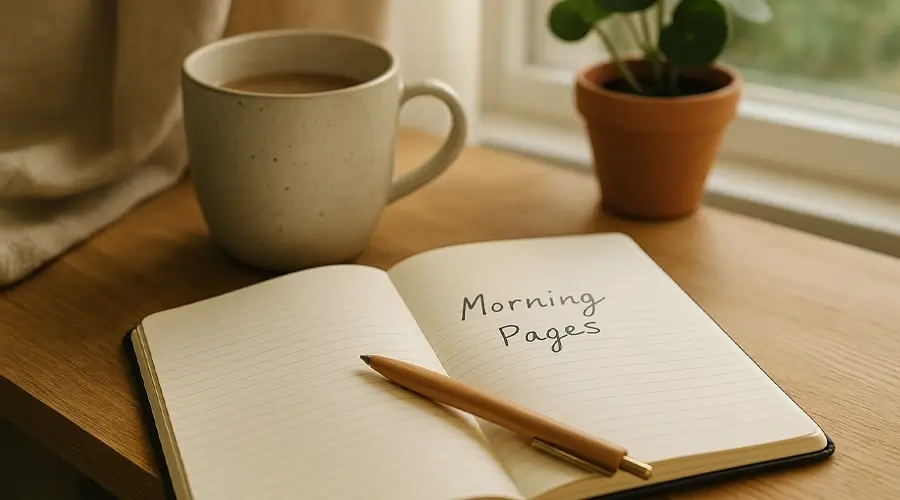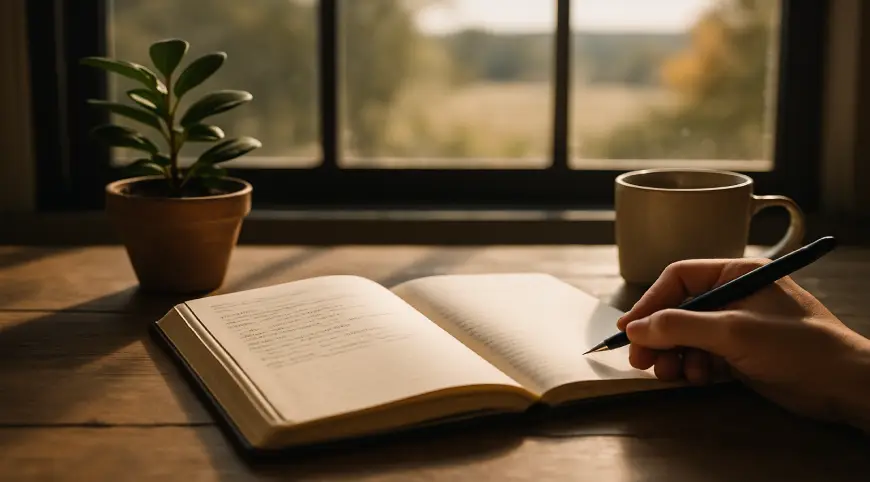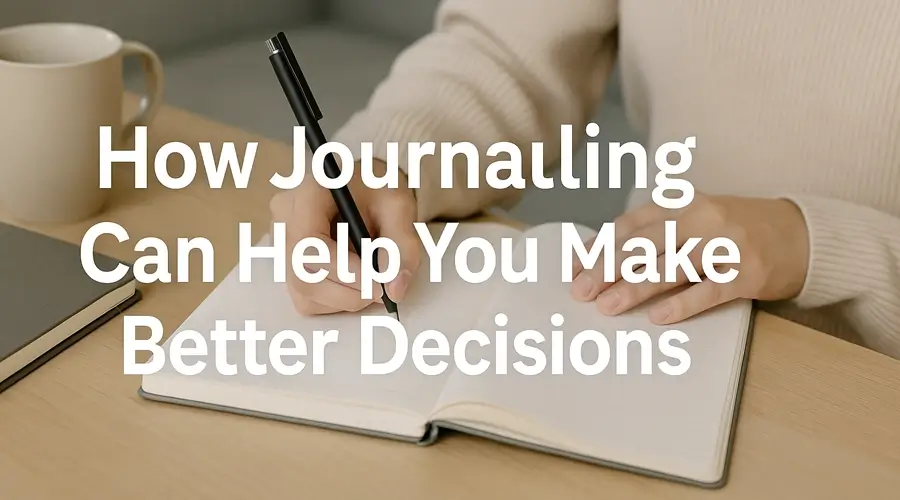You wake up with a head full of noise — half-finished thoughts, unfinished to-do lists, leftover dreams, and a quiet, nagging pressure to be productive. Before you even brush your teeth, your brain is already racing. Sound familiar?
For many of us in our 20s, 30s, or even early 40s, this is the default state: a cluttered mind, endless mental tabs open, and a creeping sense of burnout. Creative fatigue and lack of focus aren’t rare; they’re daily visitors. And in a world obsessed with optimization, we often overlook the simplest tools that can actually unlock creativity and restore inner clarity.
Enter: Morning Pages.
Morning Pages are not your average journaling practice. They’re a daily, stream-of-consciousness writing ritual that helps you clear mental clutter, process emotions, and tap into your deeper creative instincts. It’s not about being a writer — it’s about giving your thoughts space to exist so your real ideas can finally breathe. This practice, done first thing in the morning, has helped thousands of people get unstuck, reignite their creative spark, and approach the day with sharper focus.
In the next sections, we’ll explore how Morning Pages work, why they’re so effective, and how they can help you boldly unlock creativity in a way that feels natural — not forced.
What Are Morning Pages (And What They’re Not)
At first glance, Morning Pages might seem like just another journaling habit. But let’s be clear — they’re not about goal-setting, gratitude lists, or neatly written reflections. Morning Pages are raw. They’re unfiltered. And that’s exactly what makes them powerful.
Coined by author Julia Cameron in The Artist’s Way, Morning Pages are three pages of longhand, stream-of-consciousness writing done first thing in the morning. No editing. No audience. No rules — except one: just write.
This is not about writing something “good.” In fact, much of what you write may sound repetitive, messy, or downright boring. And that’s the point. The goal isn’t to create something publishable — it’s to clear the mental fog, process your emotional noise, and make room for authentic thought. You’re not writing for your creativity; you’re writing through the blocks to unlock creativity.
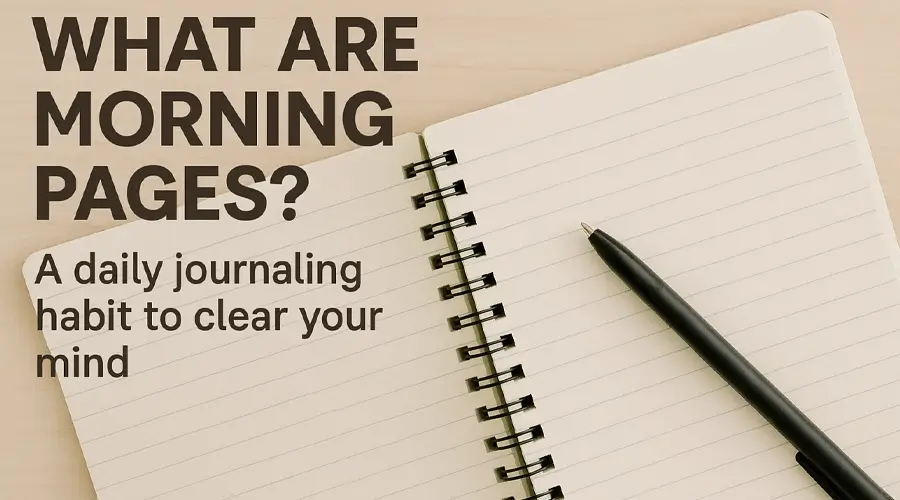
Morning Pages are not:
-
A productivity tracker
-
A space for self-censorship
-
A place to impress or perform
Morning Pages are:
-
A mental detox
-
A space to let your subconscious speak
-
A bridge between emotional chaos and creative clarity
In a world where perfectionism and overthinking constantly get in the way, Morning Pages are your daily permission slip to be messy, honest, and brilliantly unfinished.
How Morning Pages Help You Boldly Unlock Creativity
Let’s be honest — inspiration doesn’t always strike in the shower or while sipping your third coffee. Sometimes, it’s buried under self-doubt, overthinking, or the sheer noise of daily life. That’s where Morning Pages become your creative rescue mission.
By writing three pages of whatever’s on your mind — no matter how trivial, weird, or chaotic — you’re giving your brain permission to offload clutter. This process clears the surface-level noise and lets deeper, more original ideas rise up. It’s like decluttering your mental desktop before you can open the creative software.
Here’s how Morning Pages unlock creativity in a real, sustainable way:
• They silence the inner critic
You know that voice that says “This idea is stupid” or “You’re not talented enough”? Morning Pages expose it. And by putting it on paper, you take away its power. What remains is space — space for new, bold, unfiltered ideas.
• They activate creative flow
Freewriting taps into stream-of-consciousness thinking, where your thoughts flow without boundaries. This is where breakthrough ideas live — in the weird, unpolished corners of your brain. Morning Pages help you mine those corners daily.
• They lower creative pressure
When you commit to writing without needing to produce something “good,” the pressure lifts. You stop performing and start exploring. That’s the sweet spot where authentic creativity lives.
• They build a habit of showing up
Creativity doesn’t come from waiting for the muse — it comes from consistency. Writing every morning builds creative stamina and reminds your brain, “Hey, we do this now.” Over time, ideas don’t just show up — they chase you down.
Morning Pages aren’t just a technique. They’re a daily act of rebellion against perfectionism and procrastination — and a powerful tool to boldly unlock creativity, one page at a time.
Reclaiming Your Focus with Morning Pages
Focus is becoming a luxury — constantly under attack from notifications, unfinished thoughts, and the pressure to multitask. But what if the problem isn’t just external distractions — what if the real chaos is coming from within?
That’s where Morning Pages shine.
When you sit down each morning to write without a filter, you’re not just dumping words — you’re untangling your thoughts. You’re taking that noisy, tangled ball of mental clutter and slowly smoothing it out, line by line. The result? Mental clarity and focus you can carry into the rest of your day.
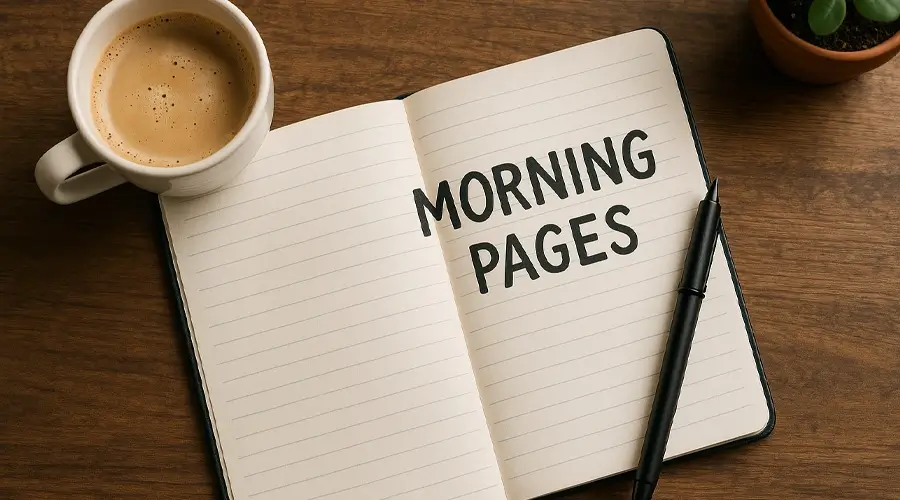
Here’s how Morning Pages help you rebuild deep focus in a distracted world:
• They create a mindful morning ritual
Instead of reaching for your phone, you start the day with intention. Writing grounds you in the present, aligns your thoughts, and helps you choose how you want to show up — not just react.
• They reduce cognitive overload
By expressing your worries, plans, dreams, and frustrations on paper, you reduce the mental noise that fights for your attention all day long. It’s like clearing your brain’s cache before you begin.
• They uncover what actually matters
As you write freely, themes start to emerge. You realize what’s taking up unnecessary space in your mind — and what truly deserves your focus. Morning Pages give you the awareness to stop chasing everything and start prioritizing something.
Morning Pages offer a quiet but radical rebellion: a few sacred moments where you choose where your mind goes. And that’s where true focus begins.
The Science (and Magic) Behind the Practice
Morning Pages might feel like a personal ritual — and it absolutely is — but it’s also backed by solid psychology and neuroscience. That pen-to-paper routine you do each morning? It’s not just self-care fluff. It’s brain training.
Let’s break down the science (and a little bit of the magic) behind why Morning Pages are so effective:
• Engages the brain’s default mode network
When you write freely, especially by hand, you activate the Default Mode Network (DMN) — the part of your brain associated with daydreaming, creativity, memory, and problem-solving. This mental “idling mode” is where many creative breakthroughs happen.
• Reduces anxiety and emotional clutter
Expressive writing has been shown to lower cortisol levels, regulate emotions, and increase emotional intelligence. By giving your mind a place to release fears and frustrations, you free up space for calm, focus, and creative thinking.
• Enhances neuroplasticity
The habit of Morning Pages strengthens your brain’s ability to form new connections and thought patterns — a key component of neuroplasticity. You’re literally training your brain to think differently, more openly, and more creatively.
• Triggers reward and motivation systems
Completing your pages gives you a small but powerful dopamine boost. That sense of accomplishment, even from something as simple as writing, activates your brain’s reward system and builds positive momentum for the day.
But beyond the science lies something more subtle — and yes, a little magical. Morning Pages are a conversation with your inner self. They help you listen to what’s usually drowned out by noise and expectation.
Real-Life Scenarios: How Morning Pages Shift Everyday Living
Let’s bring this down to earth.
The benefits of Morning Pages aren’t reserved for artists, writers, or creatives with a capital “C.” They work for anyone navigating modern life — whether you’re a freelancer juggling projects, a parent seeking mental clarity, or someone stuck in a job that drains your soul.
Here are a few real-life scenarios where Morning Pages have made a tangible difference:
• The blocked creative
A designer in her early 30s felt burned out and uninspired. Every project felt like a repeat of the last. She started Morning Pages not to be more “productive,” but to feel something again. Within weeks, she began sketching ideas that excited her — not because they were perfect, but because they were hers. Her creative voice had just been buried under pressure.
• The overthinker
A tech analyst overwhelmed by decision fatigue and daily micro-stressors started Morning Pages on a whim. He wrote about everything from bad meetings to personal doubts. Over time, he noticed patterns — the same triggers, the same anxieties. Writing gave him insight, and insight gave him power. He stopped reacting to life and started responding with clarity.
• The overwhelmed parent
A new mother struggling with postpartum emotions and identity loss used Morning Pages as a quiet, judgment-free space to reconnect with herself. It wasn’t therapy, but it was therapeutic. The act of writing gave shape to emotions that felt vague and overwhelming. Through those pages, she remembered she still had dreams — and they mattered.
What these stories show is simple but profound: Morning Pages meet you where you are, whether you’re thriving, surviving, or somewhere in between. And they give you a mirror — not of who you’re supposed to be, but who you actually are underneath the noise.
Getting Started Without Overthinking It
One of the most common traps with Morning Pages is… overthinking.
“What if I don’t know what to write?”
“What if my handwriting is ugly?”
“Isn’t this just a waste of time?”
Stop right there. The magic of Morning Pages is that they don’t require talent, structure, or even motivation. They just require presence.
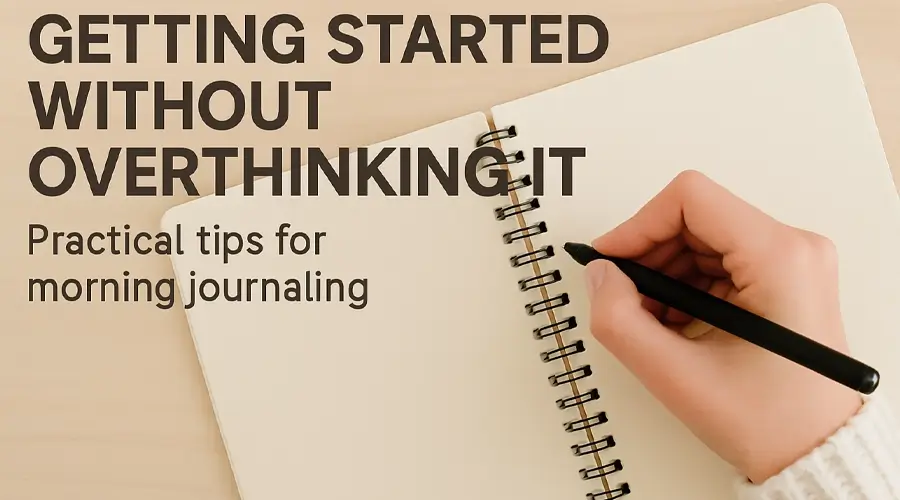
Here’s how to start — no perfection required:
• Grab a pen and a notebook (yes, handwritten is better)
This isn’t a digital task. Writing by hand slows your mind just enough to let thoughts surface naturally. Any notebook will do. Keep it by your bed.
• Write three full pages — no matter what
Don’t censor, don’t plan, don’t worry about grammar. Write whatever’s in your head, even if it’s:
“I don’t know what to write. This feels dumb. Why am I doing this?”
That counts. That’s exactly the point. Keep your pen moving until you hit three pages.
• Do it first thing in the morning
Before the world crashes in — before emails, Instagram, or even breakfast — write. That’s when your thoughts are raw, your mind unfiltered, and your inner voice loudest.
• Don’t reread them (at least not right away)
Morning Pages are not for analyzing or editing. They’re for clearing, not curating. Treat them like mental compost — rich, messy, and full of buried treasures you don’t need to dig up just yet.
The most important rule? Just show up. Not every day will be profound. Some pages will be chaotic, others dull. But if you keep writing, something remarkable happens: you start to hear yourself again.
Common Pitfalls (and How to Avoid Them)
Starting Morning Pages is easy. Sticking with them — that’s where most people stumble.
The truth is, even something as simple as writing three pages a day can stir up resistance, self-doubt, or boredom. That’s normal. But knowing what to expect can help you move through the mess and keep going.
Here are the most common pitfalls — and how to gracefully sidestep them:
• “I don’t have time in the morning.”
You don’t need an hour. 20 minutes is enough. If you’re really pressed, do one page instead of three. It’s not about quantity — it’s about showing up for yourself.
• “It feels pointless.”
Some days, yes, it will. You’ll write the same sentence over and over. You’ll feel like nothing is happening. But that’s the detox working. Like exercise, the effects build over time — and they’re most powerful when you push through the “blah.”
• “I missed a day… now I’ve failed.”
You didn’t fail. Life happens. Morning Pages are not about perfection — they’re about permission. Missed a day? Start again tomorrow. The practice is forgiving, as long as you return.
• “I don’t know what to write.”
Write exactly that: “I don’t know what to write.” Keep going. Eventually, your brain will get tired of repeating itself and drop something interesting. Trust the process.
• “I’m judging everything I write.”
That’s your inner critic — and Morning Pages are exactly how you deal with it. Keep writing through the discomfort. Over time, that voice gets quieter. Or at least, you stop believing it.
Consistency doesn’t mean perfection. It means gently returning, over and over, to a practice that reminds you who you are. Morning Pages aren’t about writing well — they’re about writing at all.
Final Thoughts: It’s Not About Perfection — It’s About Permission
In a world that tells you to optimize everything — your time, your goals, your sleep, even your creativity — Morning Pages are a radical invitation to just be.
They don’t ask for your best self. They don’t want polished sentences, curated thoughts, or impressive insights. They want your truth. As messy, honest, and human as it comes.
The real power of Morning Pages isn’t in what you write — it’s in the act of writing. Of showing up for yourself every morning, no matter your mood, energy, or doubts. Of creating space in your life that belongs to no one else but you.
Because when you do that — when you give yourself permission to be imperfect, unfiltered, and real — you unlock something far greater than a few good ideas.
You unlock yourself.
✨ Want an Easier Way to Start Your Morning Pages? Try VERBOAI
If handwriting isn’t always practical, or you’d like a smarter, more intuitive journaling experience, give VERBOAI a try. This AI-powered app helps you write your Morning Pages more easily by offering thoughtful prompts, emotional insights, and a distraction-free space to reflect.
With VERBOAI, you get the best of both worlds: your own voice — and the gentle support of intelligent technology.
It’s journaling, reimagined. Simple. Personal. Empowering.
